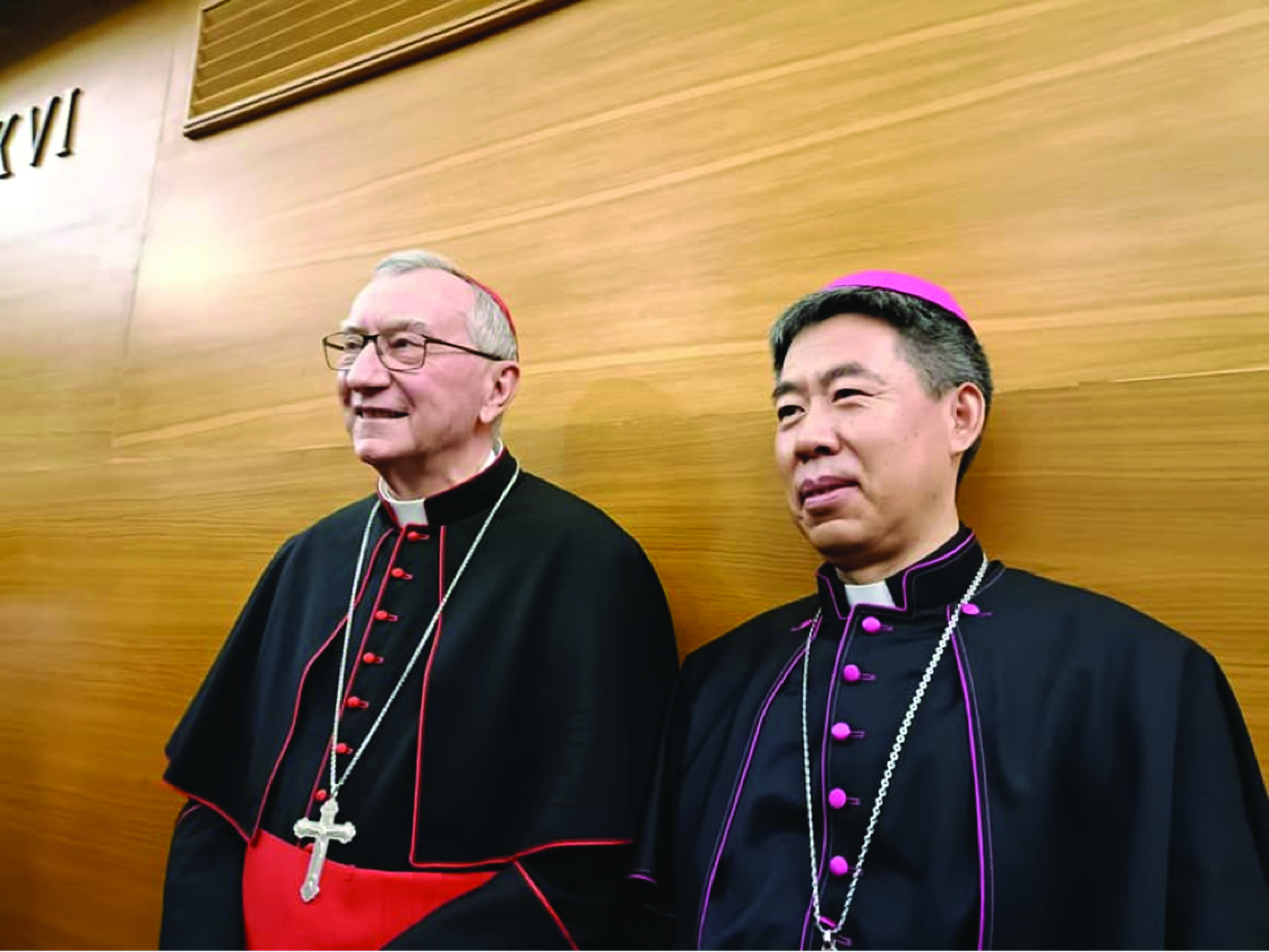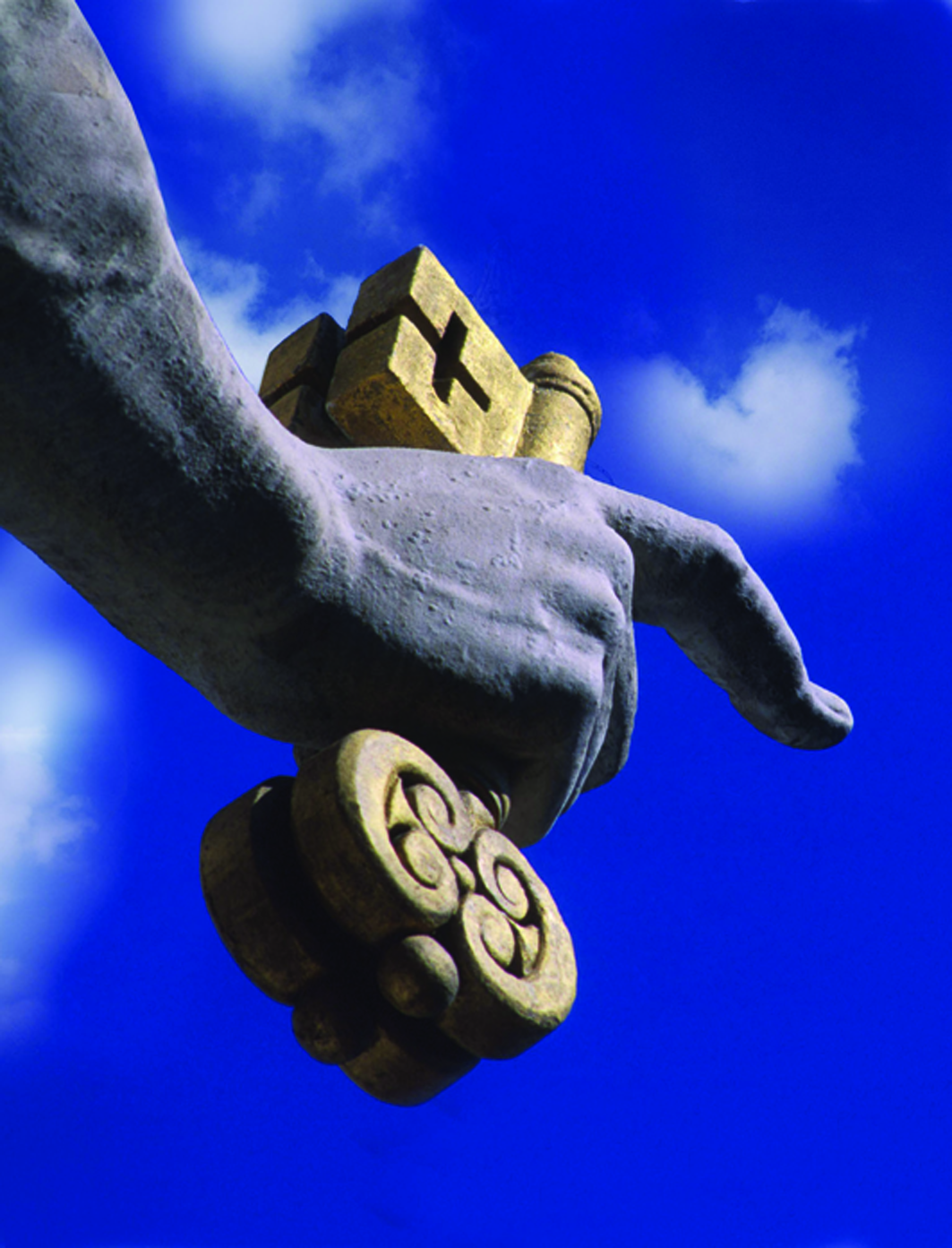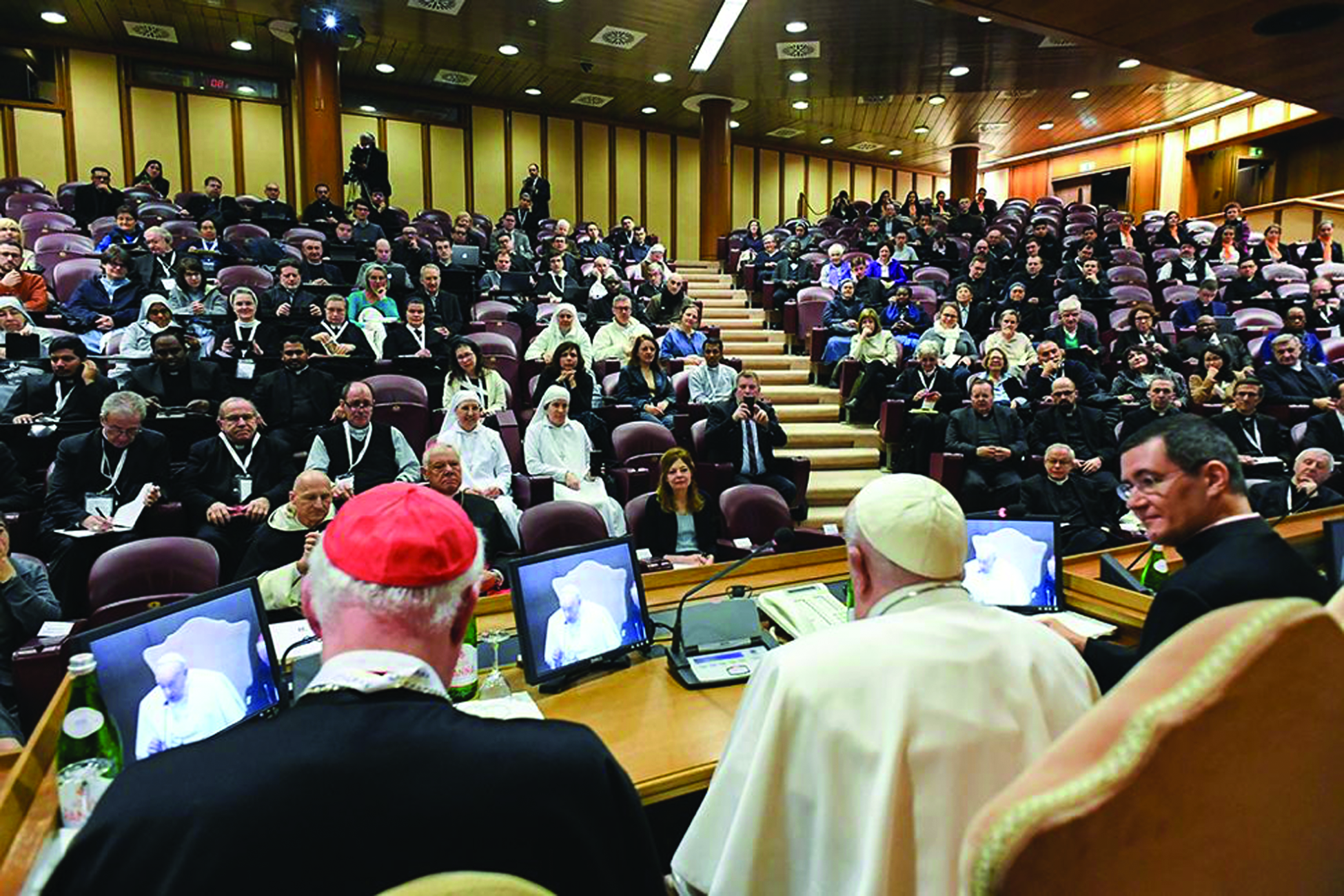“Pope Francis brings a universal message of modesty, caring for the poor, struggle for peace and care for the environment,” Zion Evrony said to Inside the Vatican. “We very much hope to see him visit Israel during the year 2014. He has been officially invited by President Peres, by Deputy Foreign Minister Elkin, and by me to visit Israel. When he comes, he will be warmly greeted by members of all religions.”
In addition to Pope Francis’ possible visit to the Holy Land, during a recent conversation with Israel’s new ambassador to the Holy See, we discussed the question of the Syrian crisis, the beatification process of Pius XII and the problem of building the controversial Cremisan Wall in Israel.
Israel’s Ambassador to the Holy See Zion Evrony was born in Iran and grew up in Israel. He arrived at his new post in Rome on August 1, 2012, to replace outgoing ambassador, Mordechay Lewy. He has served as Israel’s ambassador to Ireland and as consul general in Houston, Texas. He also served in Israel as head of the International Department and the Iranian Desk at the Policy Research Center, as head of the Policy Planning Bureau, and as a director of the Diplomatic Cadet Course. He is married and has three children.
You presented your credentials to Benedict XVI in late September 2012. On that occasion, you mentioned that “this assignment is much more than a usual diplomatic mission.” What did you mean by that?
Ambassador Zion Evrony: I believe this is a challenging position and much more than a regular diplomatic mission. To be the ambassador of Israel to the Holy See is a job unlike any other diplomatic mission I have had, because the relations between Israel and the Holy See are unique in the sense that theological and political issues are intertwined and influence each other.
I see myself as ambassador to the Catholic world because the Holy See has great influence and moral authority over 1.2 billion Catholics around the world.
You are the 6th ambassador of Israel to the Vatican. What are your goals while in Rome?
Evrony: My main goal is to improve our relations with the Holy See in the areas of cultural and academic cooperation, as well as to further cooperate in the battle against anti-Semitism and the denial of the Shoah. Furthermore, we can collaborate in promoting pilgrimages to the Holy Sites in Israel, especially the pilgrimage of Pope Francis, who will hopefully visit Israel next year… Another goal is to create a better understanding of Israel’s unique circumstances and the challenges it faces. I will also try to help in any way I can to successfully conclude the negotiations between Israel and the Holy See on the Financial Economic Agreement.
In a relatively short period of time you have met two Popes. What personal impressions did they make on you?
Evrony: I have already met Pope Francis very briefly three times: when he welcomed the diplomatic corps, when he met our president, Shimon Peres, and more recently when he met our deputy foreign minister, Mr. Zeev Elkin, who came to Rome with the Israeli delegation for the negotiations on the Financial Agreement. When I first met him he greeted me in Hebrew, “Shalom,” and at the end of our conversation he asked me to pray for him. The meeting was moving, significant, unforgettable.
Pope Francis brings a universal message of modesty, caring for the poor, struggle for peace and care for the environment. We very much hope to see him visit Israel during the year 2014. He has been officially invited by President Peres, by Deputy Foreign Minister Elkin, and by me to visit Israel. When he comes, he will be warmly greeted by members of all religions.
I also had the honor and the privilege to meet Pope Benedict XVI. When I presented my credentials to him last September, it was a moment I will always cherish and never forget. The meeting lasted about half an hour, and I was thankful for his friendship to the Jewish people.
Pope Benedict XVI impressed me as a man of spirituality and knowledge. He is a great theologian who knows the importance of dialogue between people of different beliefs.
How did you personally experience these historic times for the Catholic Church following Benedict’s resignation?
Evrony: Personally, as most people, I was surprised by the decision of Pope Benedict XVI to step down. His decision was a courageous one and deserves respect. The election of a new Pope is certainly an historic event, and it is probably one of the most important events to occur in Catholicism. It attracted the attention of both Catholics and non-Catholics all over the world. During the period of the election we saw a large number of reporters from all over the world swarming through Rome and around the Vatican. There was also great interest by the Israeli public, and during that time I gave many interviews to the Israeli media.
As a non-Catholic, what are the challenges you encounter in the environment of the Vatican?
Evrony: When I go to meetings in the Vatican and walk over the beautiful marble floors and pass the Swiss Guards, I sometimes think about the path we have traveled, Catholics and Jews, to get to the open dialogue, mutual respect and friendship of today. When I meet with members of the Curia, they show much interest and respect towards Judaism and some of them even speak a little Hebrew. But still, much work has to be done to improve our mutual understanding, at all levels. Above all I think it is important to spread the message of the Second Vatican Council and Nostra Aetate to Catholics around the world, and especially to the young generation.
What does the figure of Jesus mean to you personally?
Evrony: I always think about the fact that according to the Christian tradition Jesus was born, lived and prayed as a Jew. He spread a message of deep understanding, love and respect, for all people, and these are universal values. Obviously there are theological differences between Judaism and Christianity regarding Jesus that cannot be overcome, but this does not mean that dialogue is impossible. Throughout history the Jewish people were blamed for the killing of Jesus, but the Second Vatican Council stated that “what happened in His passion cannot be charged against all the Jews, without distinction, then alive, nor against the Jews of today.” I believe this is an important message.
The pontificate of John Paul II is a milestone in the development of good relations between Israel and the Catholic Church. Can you discuss the work of John Paul and what it means to you and to Israel?
Evrony: John Paul II’s unique relationship with the Jewish people was an important milestone in the historic legacy of his pontificate, which has had profound implications for Catholic-Jewish relations in our time. He denounced anti-Semitism as a “sin against God and humanity” and normalized relations with the Jewish people and the State of Israel. In 1994, during his pontificate, formal diplomatic relations between the Holy See and the State of Israel were established.
His visit to Israel in 2000 was of historic importance, and it will never be forgotten. He was also the first Pope to make an official papal visit to a synagogue, when he visited the Great Synagogue of Rome in 1986.
John Paul II inherited, developed and deepened the legacy of the Second Vatican Council.
The beatification process of Pius XII has divided the opinion of Jewish people and provoked strong protests. How do you approach this question?
Evrony: The beatification process is not a concern of the State of Israel. It is a matter that only concerns the Catholic Church and its believers. As to the role of Pope Pius XII during World War II, it is for historians to evaluate, and therefore we believe that opening the Vatican archives relating to that period is important. In his book, On Heaven and Earth, which I have recently read, Pope Francis agrees with the need to open the Church’s archives for the wartime years, and stresses the importance of clarifying the historical record.
The financial agreement between the Holy See and Israel has been on the agenda of the bilateral commission for a long time, for 20 years, since 1993. Is there any hope for a solution in the near future?
Evrony: We have been negotiating on and off for a long time. Some say too long, others may say, what are a few years in 2000 years of relations? The negotiations regarding the financial agreement are nearing conclusion.
We have recently solved and overcome some important obstacles, but there is still some work to be done before we can finally sign it. The Bilateral Permanent Working Commission between the State of Israel and the Holy See met on June 5, 2013, at the Vatican, at the plenary level, to continue the negotiations. The negotiations took place in a thoughtful and constructive atmosphere. Significant progress was made and the parties committed themselves to accelerate negotiations on the remaining issues, and look forward to an expedited conclusion in the near term. The parties have agreed on future steps, including holding the next plenary meeting by December 2013 in Jerusalem. I think that there is reason for optimism.
At the beginning of May, Shimon Peres, president of Israel, was received by Pope Francis at the Vatican. What were the results of the meeting?
Evrony: This was a historic meeting that contributed to further deepening of our good relations and mutual understanding.
During this meeting President Peres pointed out that there are many religious leaders in the Middle East and around the world who advocate terror in the name of God. The Pope suggested that to convene a global meeting of hope with the heads of all the world’s faiths in order to find a solution against violence and terror was very important. This is an initiative that can help promote peace and a better understanding among peoples of different religions. We have to remember that the voice of the Pope has a strong impact on more than a billion Catholics all around the world. During the meeting, Pope Francis raised the issue of anti-Semitism around the world and made it clear that anti-Semitism goes against the beliefs of Christianity. He also affirmed that anti-Semitism must be opposed in every country and in every corner of the globe.
“Israel, Peace and the Church” was the topic of a conference you gave a speech at recently. How do these terms relate to one another?
Evrony: It seems that Jewish-Catholic dialogue and our continued relationship will be one of the important focuses of this pontificate. I believe that Pope Francis will deepen this relationship even further. The major challenge is the educational one, and the Catholic Church is deeply involved in this field. It is important to educate people to peace and tolerance. We can find new ways to collaborate on this issue. Religious leaders and religious dialogue can contribute to understanding and peace, as for example in Northern Ireland. Peace with our neighbors, especially with the Palestinians, is our desire and our dream. The best way to achieve it is through direct negotiations without any precondition. I am glad the negotiations were resumed recently.
You were born in Iran. How does that shape your view of the situation in the Middle East?
Evrony: I immigrated to Israel from Iran with my family when I was one year old. I believe this family background gives me a better understanding of this country. Iran has a rich history and culture. Israel has no problem with the Iranian people, but rather with the current regime and especially its nuclear program.
Iran continues to develop its nuclear program in spite of all the economic sanctions and UN resolutions. It is the biggest threat to the stability of the Middle East and to world peace. The most dangerous regime in the world should not be allowed to develop the most dangerous weapons. It must be stopped. Much stronger sanctions are needed, and red lines should be drawn. When Iranian leaders call for the destruction and annihilation of Israel, we expect a strong condemnation from the international community.
Pope Francis, like Pope Benedict before him, has been continuously urging that a solution be found to the Syrian crisis. Is there any collaboration between the Holy See and Israel in that regard? Is not Israel the only country that has not opened its borders to receive refugees from Syria?
Evrony: It doesn’t matter where you come from, what politics you preach or what faith you belong to — no decent person can stay silent about what is happening in Syria. The use of chemical weapons against innocent civilians is terrible, a horrible addition to the crimes committed by the Syrian regime against the people of Syria. The world must ensure that radical regimes don’t have weapons of mass destruction because, as we have learned in Syria, they use them. The people of Syria are the deliberate targets of a regime that will commit any crime and cross any line to cling to power.
Assad is not the only one with the blood of the Syrian people on his hands. Iran and Hizbullah sit on his advisory board, offering guidance on how to kill Syrians more efficiently. Hizbullah has soldiers on the ground killing Syrian civilians.
The situation in Syria is tragic. None of us can be indifferent when a dictator massacres his own people, many among them children. Israel is not going to intervene in Syria, but we believe the international community has to find a way to defend Syria’s citizens. In this regard I would like to mention that about 200 wounded Syrians have been treated in Israeli hospitals.
Recently the media has picked up the legal case filed by the Salesian nuns against the building of the Cremisan Wall on their property, between Bethlehem and Jerusalem, which would harm their activity in education and providing health care. Would you comment on that?
Evrony: The reasons for the security fence in this particular location are the same reasons for its existence in other parts of the West Bank — the need to protect Israeli citizens from terrorism. Over the years, the fence has proven its effectiveness in saving lives and stopping terrorist threats time after time. In building the security fence we have taken into consideration and done our utmost to minimize disruption to the life of Palestinians. This is also the principle that guided us in the case of the Cremisan Monastery.
Evrony: In Israel we study the Bible at school because this book is our history. Since my years at school I liked the Book of Jeremiah. In particular Chapter 31:8-10:
“For a day will come when the watchmen on Mount Efrayim will call, ‘Come, let’s go up to Zion, to the Lord our God. For here is what the Lord says: “Sing with joy for Ya’akov! shout for the chief of the nations! Proclaim your praise, and say: Lord! You have saved your people, the remnant of Israel!
“See, I will bring them from the land of the north and gather them from the ends of the earth. Among them will be the blind and the lame, expectant mothers and women in labor; a great throng will return.
“They will come with weeping; they will pray as I bring them back. I will lead them beside streams of water on a level path where they will not stumble, because I am Israel’s father, and Ephraim is my firstborn son.
“Hear the word of the Lord, you nations; proclaim it in distant coastlands: ‘He who scattered Israel will gather them and will watch over his flock like a shepherd.’”
This passage refers to a day when the Jewish people would once again return to their homeland. This is precisely what happened, starting nearly a century ago. A true fulfillment of biblical prophecy.






Facebook Comments